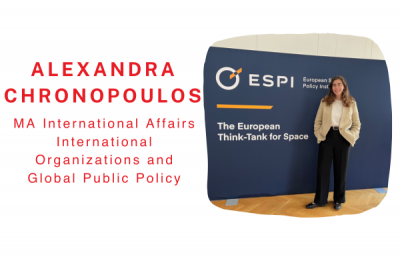Alex Chronopoulos, a graduating student from the Norman Paterson School of International Affairs (NPSIA), has taken a unique path to find her passion at the intersection of international affairs and space exploration. With a childhood fascination for the cosmos, Alex’s journey from aspiring astronaut to an advocate for space governance has led her to a career at the European Space Policy Institute.
Initially pursuing a career in journalism, Alex’s dream of becoming a foreign correspondent took an unexpected turn due to significant job cuts in the industry. Feeling adrift during her first semester, she rediscovered her childhood interest in space and recognized the evolving landscape of commercial and private actors venturing beyond Earth’s atmosphere. Intrigued by these developments, she identified an opportunity to merge her passion for international affairs with the emerging field of space governance.
due to significant job cuts in the industry. Feeling adrift during her first semester, she rediscovered her childhood interest in space and recognized the evolving landscape of commercial and private actors venturing beyond Earth’s atmosphere. Intrigued by these developments, she identified an opportunity to merge her passion for international affairs with the emerging field of space governance.
She won the Schuman Challenge in 2021, an essay competition organized by the EU delegation to Canada and run by the European Union External Action Service. This accolade afforded her the opportunity to participate in a week-long study trip to Brussels over the summer of 2022. Alex spotted another unique opportunity to extend her stay in Europe that summer – she applied and was awarded a 2-month research grant from the Jean Monnet Network on EU-Canada Relations at the University of Antwerp. It was during this period that she penned her first paper on space debris.
Now, in a groundbreaking publication titled “The Frontier Revisited: Examining the Rise of New Space Actors, the LEO Economy, and Implications for the Space Debris Problem,” published in the prestigious Princeton Journal of Public and International Affairs, she sheds light on the risks and challenges posed by accumulating space “junk”. She passionately advocates for proactive measures to mitigate the negative effects on Earth’s systems and infrastructure, emphasizing the potential catastrophic consequences if satellites critical to everyday life were destroyed by debris collisions.
Reflecting on her journey, Alex credits NPSIA for equipping her with the necessary tools to comprehend the complexities of global affairs. While initially hesitant due to the economics requirements, she quickly recognized the school’s prestigious reputation within the public service sector and the successful careers its graduates had achieved. NPSIA’s diverse experiences and opportunities, including the grant that led her to the European Space Policy Institute, played a vital role in shaping her current trajectory and she exemplifies the transformative power of following one’s passion and forging unconventional paths to success.